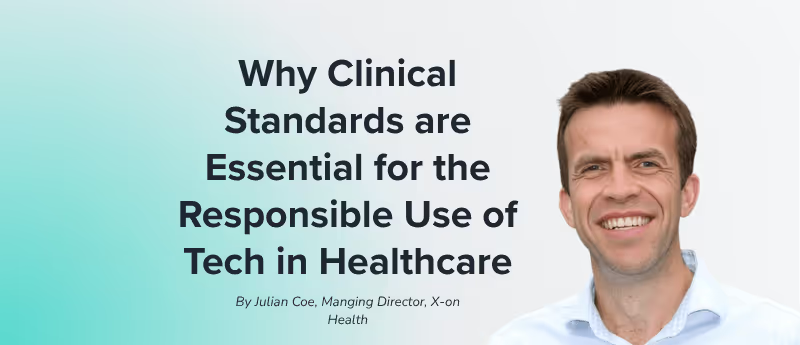Digital automation platforms in medicine
Digital automation platforms in medicine
.png)
In this interview with Neri Cohen (The Center for Healthcare Innovation, MD, USA), we discuss how digital automation platforms, like digital navigation programs (DNPs) from Rx.Health (NY, USA) can benefit patient engagement and clinical outcomes, how Bayesian Health is providing intelligent care augmentation and contributing to AI clinical decision support, and example real life use cases of AI-based decision support tools in Neri’s role as a thoracic surgeon. Neri provides his insights into how important it is to change people’s mindset towards these tools and how he expects digital automation platforms will evolve in the future.
What are digital automation platforms – like digital navigation programs (DNPs) from Rx.Health, and how can they benefit medicine?
Automated patient engagement services have evolved rapidly over the past few years to address changing patient requirements and increased clinician activities (communications, documentation, referrals, orders, etc) to coordinate care, and manage the complex reimbursement and deliver superior clinical outcomes and experiences. There is a need for an integrated care mechanism for patients, providers, payers, and other stakeholders to work together to allow for a seamless workflow for a wide variety of care journeys and communication. The digital navigation programs from Rx.Health were created to fill that need.
Patients and their families require continuous, timely engagement and feedback loops with providers to facilitate better coordination of care. Current processes are either paper-based, labor intensive or are disjointed without integration between workflows for both clinical practice and management of home-based services.
Healthcare organizations are looking for a solution to help automate patient communications and engagement, as well as to better manage provider workflows, yielding better clinical outcomes for more patients while patients, caregivers and clinicians all have a better clinical experience.
The EHR-integrated digital front door approach developed by Rx.Health gives health systems the ability to effectively meet and engage patients and their family members continuously. The platform automates outreach, engagement and monitoring of patients through EHR data and electronic patient reported outcomes (ePROs) to bring the data back to providers in the form of configurable dashboards. These dashboards are used to monitor patients utilizing the digital navigation pathway to automatically guide their journey to the desired clinical outcomes.
Healthcare organizations implement this new type of automated, clinically relevant patient engagement and communication with the goals of:
(1) Reducing staff burden by relieving them of repetitive tasks
(2) Providing standardized, uniform communications with patients and their families.
The Rx.Health platform takes a unique approach to integrate various digital interventions designed for patients and health care practitioners to enable outreach, engagement and monitoring of patients through ePROs and remote patient monitoring (RPM).
The platform allows custom rule making, integration with EHRs and the ability to directly deliver digital solutions to entire patient cohorts with built-in tracking and engagement functions using behavioral economics principles. The platform has been validated in prior studies with high usability scores (94 percentile SUS), patient engagement rates (92%) and proven outcomes (40% readmission reduction and ROIs exceeding 20x).
Automated engagement of patients using digital navigation pathways (DNPs) can be as short as minutes and as long as years. DNPs are constructed from a variety of tools shown in this pinwheel diagram:

Educational materials, ePROs, surveys, chatbots, gamification, connected RPM devices and many other tools allow you to automatically inform, remind, educate and collect information from a single patient or thousands of patients as once.
How is Bayesian Health contributing to AI clinical decision support?
Bayesian Health's clinical AI platform is a significant step forward in healthcare. Utilizing data from the EHR and cutting-edge machine learning, Bayesian transforms complex data sets into valuable insights for front-line clinicians with sufficient lead time to intelligently augment care and proactively intervene in patients’ clinical courses. The platform equips clinicians with objective interpretations, enabling them to promptly detect potential health risks present in their patients, streamlining workflow and making the healthcare experience more efficient and effective, which yields better clinical outcomes.
Bayesian’s research partnership with Johns Hopkins (MD, USA) has yielded results that are transformative. Published as a series of articles and featured on the cover of Nature Medicine in 2022, the findings demonstrated an 18.2% relative decrease in sepsis patient mortality rates.
This achievement marks the first-time clinical AI has been deployed at the bedside to yield substantial improvements in mortality, morbidity, and cost of care. What's more, Bayesian leverages sophisticated human factors research, which yielded a novel approach to human-machine interaction, leading to adoption of the platform reaching an impressive rate of 89% amongst clinicians that was sustained for the duration of the study.
Sepsis is the leading cause of death in hospitals, impacting more than 270,000 adults per year. Many of those deaths are preventable but every minute is critical, hence the importance of the early identification and intervention that Bayesian enables. The clinical results and the prevalence of sepsis drove the FDA designation of Bayesian’s sepsis platform as a Breakthrough Medical Device, a coveted recognition for medical devices that offers significant advantages over existing options for patients with life-threatening or debilitating conditions.
Trust is instrumental in the adoption of any technology. Clinicians trust the Bayesian platform because of the novel intuitive alerting process and collegial and consultative interaction soliciting clinicians’ input to the dynamic adaptive AI. The research with Johns Hopkins demonstrated a compelling positive correlation between trust in the platform and reductions in mortality. This focus on trust-building has facilitated the aforementioned adoption rate, which is significantly higher than typical Clinical Decision Support applications.
Bayesian Health's technology signifies a transformative breakthrough in the application of AI/ML in healthcare. The platform combines state-of-the art models, human-centered design and dynamic adaptive technology. These features not only enhance caregiver capability and save lives but also offer a solution to some challenges of clinician burnout and staffing shortages, presenting a paradigm shift in patient care.
Are there any examples of you utilizing such AI-based decision support tools in your role as a thoracic surgeon?
AI-assisted prediction models for postoperative complications in thoracic surgery:
- Using AI-based prediction models, the risk of postoperative complications in thoracic surgery patients can be assessed and addressed. By analyzing preoperative patient data, such as demographics, comorbidities, stage of disease and diagnostic imaging, AI algorithms can be trained to identify patterns and make predictions. The potential benefits of such tools in improving patient outcomes by enabling surgeons to proactively manage high-risk patients, personalize treatment plans and optimize surgical decision-making are still being investigated. One benefit, already realized, is prescribing prehabilitation physical therapy conditioning – cardiopulmonary exercise physiology, core muscle strengthening and enhanced balance and endurance – prior to surgery in selected patients.
Computer-assisted image analysis for lung nodule detection and classification:
- AI algorithms are being used for computer-assisted image analysis in thoracic surgery. With the advancements in medical imaging technology, the volume of imaging data generated in lung cancer diagnosis and staging has increased significantly. AI algorithms can be trained to detect and classify lung nodules on computed tomography (CT) scans, assisting radiologists and surgeons in identifying suspicious areas and making accurate recommendations on index of suspicion for malignancy. The AI-guided, human in the loop algorithms are a valuable decision support tool in lung cancer screening programs to improve early detection, treatment planning and follow-up monitoring of lung cancer patients.
AI-driven enhancement of Extended Reality (XR) – Virtual Reality (VR), Augmented Reality (AR) and Mixed Reality (MR) - assistance in thoracic surgery procedures:
- Robotic-assisted surgery has gained popularity in thoracic procedures due to its precision and minimally invasive nature. By incorporating AI algorithms into the robotic surgical system, surgeons can receive real-time assistance and feedback during the operation. The AI system can analyze intraoperative data, such as tissue characteristics, anatomical landmarks and instrument positioning to provide guidance and enhance surgical precision. Benefits of AI-driven assistance in the operating room are improving surgical outcomes, reducing complications and shortening patient recovery time.
- The integration of AI-assistance in XR platforms for thoracic surgical procedures can be applied to many aspects to improve care. More realistic simulation can deliver more effective training, credentialing and remote assistance of novice surgeons by skilled surgeons.
What are the main barriers to implementing these digital automation platforms? How important is it to change people’s mindset towards these tools?
Main barriers to implementing digital automation platforms:
- Resistance to change: People, especially clinicians and clinical support staff, within the organization may be resistant to change, especially when it comes to adopting new technologies and automation tools. They may fear job losses, unfamiliarity with the technology, or a disruption to their existing work routines.
- Cost and budget constraints: Implementing digital automation platforms can require significant investments in terms of software, hardware and infrastructure. Many organizations may not have the necessary budget to undertake such initiatives.
- Complex legacy systems: Organizations have made foundational investments in massive EHR programs and with other complex and outdated legacy systems that lack modern cutting-edge AI/ML and digital automations programs, platforms and tools.
- Skill gaps and training needs: Digital automation and AI/ML platforms often require specialized skills to set up, configure and maintain. Organizations may lack the necessary expertise within their workforce, leading to skill gaps that need to be addressed through training and upskilling initiatives.
- Lack of understanding and awareness: Many organizations may not be aware of the benefits and potential of digital automation platforms, or they may not fully understand how these platforms can streamline their processes and improve efficiency.
- Data security and privacy concerns: Automation platforms often involve handling sensitive data and require secure infrastructure to protect against cyber threats and ensure compliance with data protection regulations. Organizations may face challenges in implementing robust security measures.
Importance of changing people's mindset towards these tools:
- Cultural shift: Changing people's mindset towards digital automation platforms is crucial for successful implementation. It requires a cultural shift within the organization, where employees embrace automation as an opportunity rather than a threat.
- Maximizing benefits: Digital automation platforms have the potential to significantly enhance clinical outcomes, productivity, streamline processes and free up human resources for more strategic tasks. However, without a positive mindset towards these tools, organizations may not fully leverage their benefits.
- Adaptability and agility: In today's rapidly evolving business landscape, organizations need to be adaptable and agile to stay competitive. Embracing digital automation tools can enable faster and more efficient clinical operations, allowing clinicians and staff to respond effectively to changing clinical courses.
- Empowering employees: Automation platforms can empower employees by automating repetitive and mundane tasks, allowing them to focus on more creative and value-added work. Changing the mindset towards these tools helps employees view automation as a tool that enhances their capabilities rather than replacing them.
- Continuous improvement: Digital automation platforms require ongoing optimization and refinement. Having a mindset that embraces change and continuous improvement is crucial for organizations to maximize the value and effectiveness of these tools.
- Future readiness: As automation and digital transformation continue to accelerate, organizations need to develop a future-ready mindset to adapt to the evolving technological landscape. Changing people's mindset towards automation tools helps organizations remain competitive and thrive in the digital age.
How can these barriers by overcome?
- Education and Training: Providing comprehensive training and awareness programs to employees and stakeholders to familiarize them with the benefits and functionalities of digital automation platforms promotes trust in the data, the models and the clinical responses suggested by the platforms.
- Leadership Support: Gaining support from top clinical and scientific leaders engages clinicians and can help overcome resistance and motivate clinical, support and finance staff who will then champion the technology to management and executive leaders, who then facilitate the adoption of digital automation and AI/ML technologies and platforms.
- Pilot Projects and Proof of Concept: Implementing small-scale pilot projects to demonstrate the effectiveness and positive clinical, financial and staffing impact of digital automation platforms.
- Collaboration and Communication: Encouraging open dialogue and communication channels between different teams and departments to address concerns and gather feedback.
- Prioritizing robust ongoing data surveillance to mitigate drift, shift and bias in AI models.
- Acknowledging the importance of Security and Privacy and implementing robust security measures and addressing privacy concerns through effective data governance strategies overseeing AI/ML and workflow automation platforms.
In your opinion, what does the future hold for digital automation platforms in medicine?
- Improved Patient Care: Automation can enhance patient engagement, achieving better clinical outcomes by improving care, for example reducing errors and enabling real-time monitoring of vital signs, medication adherence, and treatment plans.
- Enhanced Efficiency and Efficacy: Digital automation platforms will liberate clinicians from the burdens of administrative tasks, such as appointment scheduling, patient registration, and billing, reducing paperwork and improving overall operational efficiency in healthcare facilities.
- Patient Empowerment: Automation platforms will enable patients to have better access to their medical records, personalized health information, and self-management tools, empowering them to actively participate in their own healthcare.
- Precision Medicine: Digital automation can enable the analysis of vast amounts of patient data, leading to more personalized and targeted treatment plans, advancing the field of precision medicine, yielding better patient outcomes and a better healthcare delivery experience for both patients and clinicians.
- Telemedicine Expansion: Automation platforms will support the growth of telemedicine, enabling remote patient consultations, remote monitoring and digital health interventions. This provides convenient and accessible healthcare services.
- Integration with Internet of Things (IoT) and Wearable Devices: Digital automation platforms will integrate with IoT devices and wearable technologies, allowing seamless data exchange between patients and healthcare providers, facilitating remote monitoring and preventive care.
- AI-powered Diagnosis and Treatment: Automation platforms will leverage AI algorithms to assist in diagnosing diseases, analyzing medical images, suggesting treatment options, improving accuracy and reducing diagnostic errors.
- Enhanced Data Analytics: Automation platforms will utilize advanced data analytics techniques to derive valuable insights from large healthcare datasets, leading to improved clinical decision-making, research and public health initiatives.
- Regulatory Compliance: Digital automation platforms will adapt to evolving regulatory requirements, ensuring compliance with privacy and security regulations, such as HIPAA, and maintaining patient data confidentiality.
- Continued Technological Advancements: As technology continues to evolve, digital automation platforms will benefit from advancements in machine learning, natural language processing, robotics, extended (virtual, augmented and mixed) reality and automation, further enhancing their capabilities in medicine.
These trends are clear indications that digital automation and AI/ML platforms have a promising future in medicine: transforming healthcare delivery, improving patient outcomes, reducing clinician burnout, returning joy to the practice of medicine, and driving innovation in the industry.
Interviewee profile:

Neri M. Cohen MD, PhD is President of the Center for Healthcare Innovation (MD, USA) – a non-profit center supporting research into innovation in healthcare delivery; Lead Clinical Informaticist at Bayesian Healthcare (NY, USA) – an award-winning data science company that delivers a platform that supercharges the electronic medical record (EMR), transforming the vast repository of data into highly accurate clinical alerts delivered to care teams to identify, intervene and prevent life threatening complications and death; Chief Medical Information Officer at Rx.Health – an award-winning digital health unification, automation and monitoring company committed to providing inventive, convenient, connected, patient-centric care while creating efficiencies for clinical teams; Chief Medical Officer at Bearpac Medical (NH, USA) – a startup company developing novel approaches to management of pleural and pulmonary diseases; and President of HealthTek Consulting – a Healthcare consulting firm in Baltimore, MD (USA).
He is the immediate past Chief Medical Information Officer (CMIO) at GBMC Healthcare (MD, USA); Health System Lead Clinical Informatics Liaison and Vice-Chair (Innovation, Information & Technology) of the Department of Surgery, Chief of the Division of Thoracic Surgery and Head of the Thoracic Oncology Program at the Sandra & Malcolm Berman Cancer Institute at GBMC Healthcare Inc. and Past Chairman of the Board of Governors and Past President of the Baltimore County Medical Association (MD, USA).
Neri is an accomplished Physician Executive with more than 2 decades of focused continuous quality improvement to achieve outstanding clinical outcomes. His work has been nationally cited as proven success in utilization of healthcare information technology and data analytics to achieve the quadruple aims – better health, better care, least waste, and more joy.
A recognized champion of digital health transformation, he is a strong advocate for empowering patients and caregivers to engage with clinicians to consume healthcare in innovative manners. Demonstrating unique skills, he manages and strengthens internal structures to keep organizations agile and responsive to changing demands.
Neri is an expert in integrating in-depth, practical knowledge of clinical operations, with robust experience implementing and driving effective use of electronic health record (EHR) systems, incorporating evidence-based medicine into computer applications, decision support systems, novel reimbursement models to connect the needs and perspectives of patients and clinicians with the capabilities and expertise of leaders in information technology to advance clinical excellence and liberate clinicians to do what they went into medicine for, namely, empathy, human touch and healing.
As a clinical and IT leader, he was actively involved in GBMC’s work redesigning healthcare delivery achieving the Malcolm Baldrige National Quality Award in 2020. During his tenure as Lead Clinical Informatics Liaison & CMIO, GBMC was recognized by HIMSS for stage 7 EMR adoption and the only organization to win the HIMSS Davies Award three years in a row (2019-2021) for work leveraging data & technology to improve clinical care and outcomes.
When in clinical practice, Dr Cohen was named a Top Doc by Baltimore magazine and one of America’s Top Doctors by US News & World Report and Castle Connolly for 13 years in a row. His practice was repeatedly cited for top 1% recognition of patient centered care and patient satisfaction. Moreover, Dr Cohen participated in the Society of Thoracic Surgeons (STS) National Database since its inception and his clinical results recognized in the top 5% of thoracic surgery practices nationwide for risk adjusted outcomes.
.png)
.png)
.png)



